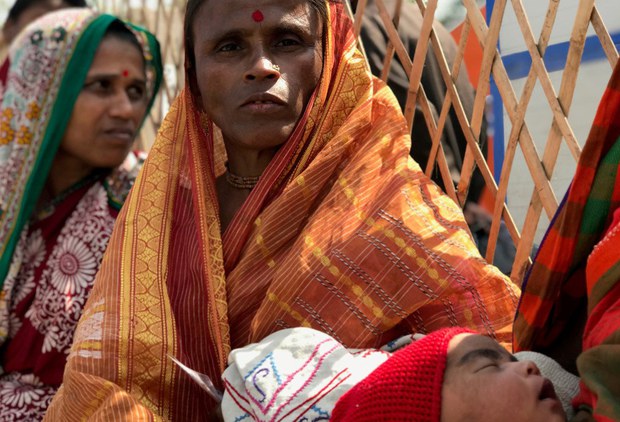Myanmar, UN MoU will Ease Rohingya Repatriation: Bangladeshi Official
2018.06.01
Bangladesh
 A Rohingya woman waits outside a Malaysian-run field hospital at the Kutupalong refugee camp in southeastern Bangladesh’s Cox’s Bazar district, Jan. 23, 2018.
A Rohingya woman waits outside a Malaysian-run field hospital at the Kutupalong refugee camp in southeastern Bangladesh’s Cox’s Bazar district, Jan. 23, 2018.
Updated at 5:27 p.m. ET on 2018-06-01
A senior Bangladeshi official on Friday welcomed a memorandum of understanding struck between Myanmar’s government and United Nations agencies regarding the repatriation of Rohingya refugees to Rakhine state, saying it would ease the process.
In a diplomatic breakthrough a day earlier, the Naypyidaw government along with the U.N. refugee agency (UNHCR) and U.N. Development Program (UNDP) announced that they had agreed to a memorandum aimed at creating conditions for the “voluntary, safe dignified and sustainable” return of Rohingya.
“This is a positive development we think,” Mohammad Abul Kalam, Bangladesh’s commissioner for refugee relief and repatriation, told BenarNews late Friday.
“[T]he MoU with UNHCR and UNDP will help smoothen the repatriation process. We can work in a coordinated way for repatriation of the Rohingya,” he added.
Kalam declined to comment further on the issue, saying the Bangladeshi government had not seen details of the memorandum.
In April, Bangladesh and UNHCR signed a separate memorandum on the voluntary repatriation of the stateless Rohingya refugees.
That agreement and the MoU between Myanmar and the U.N. agencies came months after Dhaka and Naypyidaw struck a bilateral deal in November 2017, where they agreed to work together to repatriate thousands of Rohingya who had escaped to Bangladesh after fleeing cycles of violence in Rakhine since October 2016.
Sometime next week, the two U.N. agencies and Myanmar were to sign off on their MoU, according to UNHCR.
United Nations officials described the latest memorandum as a needed first step in creating conditions conducive to the safe and voluntary repatriation of the Rohingya.
“The agreement will provide a framework for UNHCR and UNDP to be given access to Rakhine State, including to refugees’ places of origin and areas of potential return that has not been permitted since violence broke out in August 2017,” UNHCR said in a statement on Thursday.
The refugee agency was referring to a brutal military crackdown in Rakhine state last year that followed attacks on police outposts by a group of Rohingya insurgents and that drove nearly 700,000 Rohingya to seek shelter across the border in Bangladesh.
“The access, once effective, will allow UNHCR to assess the conditions on the ground and carry out protection activities. This will also enable UNHCR to eventually provide independent information to refugees about the conditions in their places of origin, helping them to make informed decisions if the conditions are right for them to return in safety and dignity,” the agency added.
In Dhaka on Thursday, UNHCR Assistant High Commissioner George Okoth-Obbo told reporters that conditions were not safe for the repatriation of the Rohingya from refugee camps and settlements in southeastern Bangladesh.
On the same day, Myanmar’s government announced that it was setting up an independent commission to investigate alleged atrocities committed during the military crackdown in Rakhine.
The U.N., the United States and other members of the international community have branded the atrocities targeting Rohingya as “ethnic cleansing,” but Myanmar officials have rejected those allegations.
‘It is mysterious’
In related developments, Bangladeshi officials on Friday said Myanmar’s government had shared a list of 1,222 Rohingya who would be allowed to return to Rakhine even though Naypyidaw officials was not requiring that they be verified first for repatriation. This group is comprised 778 Rohingya Muslims and 444 Hindus, according to a report by Bangladesh’s foreign ministry submitted to a parliamentary standing committee on Thursday.
Bangladeshi officials said the 1,222 were separate from a list of more than 8,000 Rohingya names that Myanmar had previously verified for repatriation under the terms of the November 2017 bilateral agreement.
“The Myanmar government has shown their interest several times to repatriate 444 Hindus and 778 Muslim Rohingyas who were not included in the list on a prority basis,” the ministry said in its report.
“Myanmar always talks about verification during discussions on repatriation … but it is mysterious that they want to take these specific people back without verification,” Kalam, the commissioner for refugee relief and repatriation, told BenarNews.
Refugee Survey
A survey release last week by Xchange Foundation, a migration research group, found that nearly all Rohingya were pleased to be in Bangladesh.
It found 98.65 percent of 1,700 Rohingya surveyed said they felt welcome. Even more respondents, 99.41 percent, said they felt safe during the day – a figure that dropped to 95.89 percent at night.
When asked about the prospect of being repatriated to Myanmar, nearly 97 percent of respondents said they didn’t want to stay in Bangladesh permanently, but only less than 2 percent said they had “no fear about returning to Myanmar.”
Nearly 98 percent said they would consider returning to Myanmar, but 99 percent said they would only go back on condition that they be given Myanmar citizenship, as well as freedom of movement and religion, according to the survey.
Meanwhile, a little more than half of those surveyed said they were aware that Bangladesh and Myanmar had agreed to repatriate Rohingya. Broken down by gender, the survey found 57 percent of men knew compared with 47 percent of women.
When asked how they learned about repatriation, 282 men said through the media while 106 said they learned through the chief of their camp. The greatest number of women, 271, said they learned from family, friends and neighbors.







